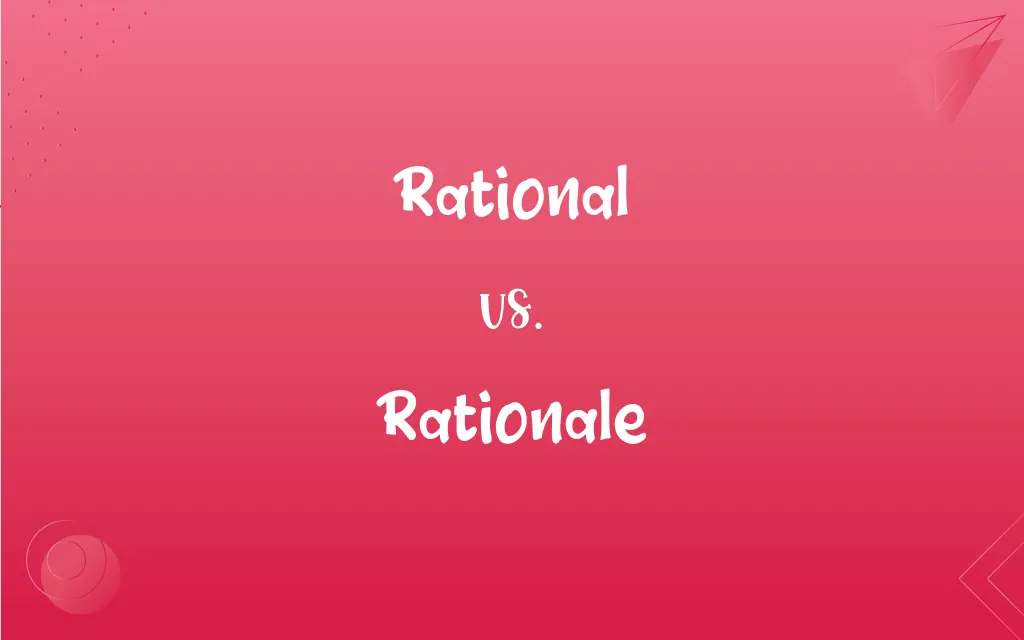Rational vs. Rationale: What's the Difference?
Edited by Aimie Carlson || By Janet White || Published on November 10, 2023
Rational vs. Rationale: "Rational" describes someone or something logical, while "Rationale" is the underlying reason for something.

Key Differences
"Rational" pertains to the use of reasoning or logic. It’s an adjective that describes a person who makes decisions based on logical thought processes, not emotions. For example, a rational individual carefully considers all information before making a decision. "Rationale," however, is a noun that refers to the fundamental reason for something or the basis upon which a decision is made. It’s the justification that underpins a particular action, thought, or system.
"Rational" behavior or thought is characterized by adherence to logic or reason. When we describe a decision, argument, or person as rational, we are saying that they are based on or in accordance with reason or logic. On the other hand, "rationale" is concerned with explaining why. When people provide a rationale, they are giving the logical basis or justification for their actions or beliefs.
A "rational" approach or decision is one that is made based on facts, analysis, and reasoning. It's devoid of emotion, speculation, or impulse. Conversely, a "rationale" does not describe an approach but rather supports it. It's the underlying logic that explains why a particular decision was rational, to begin with. It's the because in "I did this because..."
"Rational" can also imply a state of sanity or clear-mindedness, where one's mental faculties are operating logically. For instance, after a shock, someone might need time to become rational again. "Rationale," however, does not describe a state of mind but is the articulated reasoning or justification behind a specific stance or action, often detailed after the fact.
"Rational" is an adjective, often used to describe decisions, thoughts, or individuals who operate based on reason rather than emotion. "Rationale," however, is a noun, referring specifically to the set of reasons offered to justify an action, belief, or system. You might question someone’s rationale, seeking the logic behind their decisions, which you hope would be rational.
ADVERTISEMENT
Comparison Chart
Part of Speech
Adjective
Noun
Definition
Based on logical reasoning
The reason behind something
Usage Context
Describing decisions/thoughts
Explaining decisions
Emotional Influence
Usually devoid of emotion
Justifies decisions, can be emotional
Application
Applied to people/things
Used to explain reasons
ADVERTISEMENT
Rational and Rationale Definitions
Rational
Rational: Relating to, based on, or agreeable to reason.
A rational explanation eased their concerns.
Rationale
An underlying principle; basis.
The project's rationale was clearly outlined.
Rational
Rational: Free from emotion; objective.
Despite his worries, he kept a rational perspective.
Rationale
The fundamental reason or justification.
His rationale for leaving was sound.
Rational
Rational: Based on clear, logical thinking.
She made a rational decision after considering all facts.
Rationale
The thought process leading to conclusions.
The rationale behind the theory intrigued many.
Rational
Having or exercising the ability to reason.
Rationale
Logical reasoning behind decisions.
She explained her rationale calmly.
Rational
Consistent with or based on reason or good judgment; logical or sensible
Rational decisions.
Rationale
Explanation or justification of an act.
The document provided the rationale for the changes.
Rational
Of sound mind; sane
Wondered if the eccentric neighbor was not completely rational.
Rationale
The fundamental reasons for something; the basis
The rationale for dropping the atomic bomb.
Rational
(Mathematics) Capable of being expressed as a quotient of integers.
Rationale
An explanation of the basis or fundamental reasons for something.en
Rational
A rational number.
Rationale
A justification or rationalization for something.
Rational
Capable of reasoning.
Man is a rational creature.
Rationale
A liturgical vestment worn by some Christian bishops of various denominations.
Rational
Logically sound; not self-contradictory or otherwise absurd.
His statements were quite rational.
Rationale
An explanation or exposition of the principles of some opinion, action, hypothesis, phenomenon, or the like; also, the principles themselves.
Rational
(of a person or personal characteristics) Healthy or balanced intellectually; exhibiting reasonableness.
Rational conduct
Rationale
(law) an explanation of the fundamental reasons (especially an explanation of the working of some device in terms of laws of nature);
The rationale for capital punishment
The principles of internal-combustion engines
Rational
Of a number, capable of being expressed as the ratio of two integers.
¾ is a rational number, but √2 is an irrational number.
Rational
Of an algebraic expression, capable of being expressed as the ratio of two polynomials.
Rational
(chemistry) Expressing the type, structure, relations, and reactions of a compound; graphic; said of formulae.
Rational
(physics) Expressing a physical object.
A rational table is physical, a written table is neither.
Rational
(mathematics) A rational number: a number that can be expressed as the quotient of two integers.
The quotient of two rationals is again a rational.
Rational
(historical) The breastplate worn by Israelite high priests.
Rational
Relating to the reason; not physical; mental.
Moral philosophy was his chiefest end; for the rational, the natural, and mathematics . . . were but simple pastimes in comparison of the other.
Rational
Having reason, or the faculty of reasoning; endowed with reason or understanding; reasoning.
It is our glory and happiness to have a rational nature.
Rational
Agreeable to reason; not absurd, preposterous, extravagant, foolish, fanciful, or the like; wise; judicious; as, rational conduct; a rational man.
Rational
Expressing the type, structure, relations, and reactions of a compound; graphic; - said of formulæ. See under Formula.
What higher in her society thou find'stAttractive, human, rational, love still.
A law may be reasonable in itself, although a man does not allow it, or does not know the reason of the lawgivers.
Rational
A rational being.
Rational
Consistent with or based on or using reason;
Rational behavior
A process of rational inference
Rational thought
Rational
Of or associated with or requiring the use of the mind;
Intellectual problems
The triumph of the rational over the animal side of man
Rational
Capable of being expressed as a quotient of integers;
Rational numbers
Rational
Having its source in or being guided by the intellect (distinguished from experience or emotion);
A rational analysis
Rational
Rational: Sane; possessing mental clarity.
He seemed rational despite the crisis.
Rational
Rational: Reasonable; sensible.
Her demands were completely rational.
FAQs
Does "rational" mean emotionless?
Not necessarily, but it emphasizes logic over emotion.
Can a "rationale" be flawed?
Yes, if the underlying reasoning is faulty or biased.
Can "rationale" include beliefs?
Yes, beliefs can form part of the justification provided.
Can "rationale" be emotional?
It can include emotional reasons, but it's usually logical.
Can "rationale" be predictive?
Yes, if it's outlining reasons for future actions.
Is "rational" subjective?
It can seem so, but it's meant to be based on objective reasoning.
Can "rationale" change?
Yes, especially if new information or perspectives emerge.
Who decides a "rationale's" validity?
It's often subjective, but peers, experts, or outcomes can.
Can a "rational" person be emotional?
Yes, but rational decisions are typically made with logic over emotion.
Does "rationale" require evidence?
Often, yes, to support or justify the reasoning.
Can "rational" decisions be wrong?
Yes, if based on incorrect information or assumptions.
Are "rational" thoughts always conscious?
Generally, as they require deliberate reasoning.
Is being "rational" always practical?
Mostly, but context and emotions can be important, too.
Does "rational" mean intelligent?
Not always, but it does involve logical thinking.
Can "rational" involve intuition?
Typically, it's based more on conscious reasoning.
Is "rationale" necessary for decisions?
Often, as it provides justification and understanding.
Is "rational" always the best approach?
It's highly valued, but emotions and ethics also matter.
Is "rationale" subjective or objective?
It can be either, depending on the context and presenter.
Can "rationale" be retrospective?
Yes, it's often formed after reflecting on actions.
Can animals be "rational"?
Debateable, though some believe they can be to an extent.
About Author
Written by
Janet WhiteJanet White has been an esteemed writer and blogger for Difference Wiki. Holding a Master's degree in Science and Medical Journalism from the prestigious Boston University, she has consistently demonstrated her expertise and passion for her field. When she's not immersed in her work, Janet relishes her time exercising, delving into a good book, and cherishing moments with friends and family.
Edited by
Aimie CarlsonAimie Carlson, holding a master's degree in English literature, is a fervent English language enthusiast. She lends her writing talents to Difference Wiki, a prominent website that specializes in comparisons, offering readers insightful analyses that both captivate and inform.








































































